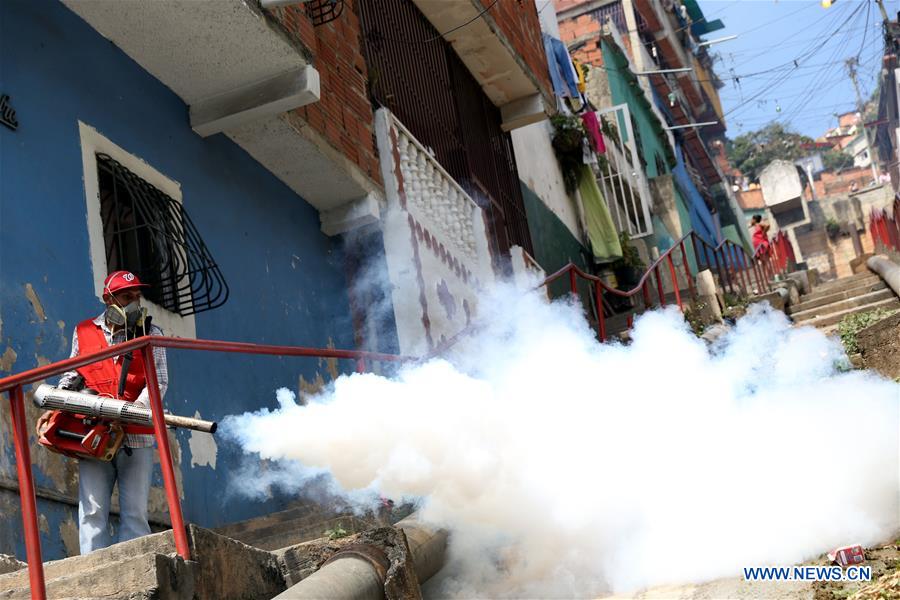


CARACAS, Jan. 28, 2016 -- A health employee takes part in a spraying day against the Aedes Aegypty mosquito in El Valle in Caracas, capital of Venezuela, Jan. 28, 2016. Venezuela Health Minister Luisana Melo admitted Thursday 4,700 suspicious cases of Zika in Venezuela. Following World Health Organization's (WHO) decision on Thursday to convene an emergency committee on the Zika virus situation, unit chief for International Health Regulations epidemic alert and response Sylvain Aldighieri said: "We expect huge numbers of infections, some detected and others undetected." (Xinhua/Fausto Torrealba/AVN)
UNITED NATIONS, Jan. 28 -- Zika virus is spreading "explosively" in the Americas, and could spread even further afield amid an "extremely high" level of alarm, said a senior official of the World Health Organization (WHO) on Thursday.
Margaret Chan, WHO director-general, made the statement while briefing WHO's board members in Geneva on the Zika situation, UN spokesman Stephane Dujarric said at a daily news here.
Chan said that as of Thursday, Zika cases have been reported in 23 countries and territories in the region.
Symptoms of Zika virus, which is spread to people through mosquito bites, include low-grade fever, joint pain, rash, conjunctivitis, headache, muscle pain and eye pain.
"Chan explained that a causal relationship between the virus infection, and birth malformations and neurological syndromes has not yet been established, but is strongly suspected," Dujarric said. "And the possible links, only recently suspected, have rapidly changed the risk profile of Zika, from a mild threat to one of alarming proportions."
She added that the increased incidence of microcephaly is particularly alarming, as it places a heart-breaking burden on families and communities.
"WHO is deeply concerned about the rapidly evolving situation for four main reasons -- the possible association with birth malformations and neurological syndromes; the potential for further international spread; the lack of population immunity in newly affected areas; and the absence of vaccines, specific treatments, and rapid diagnostic tests," Dujarric said.
"Conditions associated with this year's El Nino weather pattern are also expected to increase mosquito populations greatly in many areas," the spokesman said.
Chan will convene an International Health Regulations Emergency Committee on the virus and observed increase in neurological disorders and neonatal malformations on Feb. 1 in Geneva to ascertain whether the outbreak constitutes a Public Health Emergency of International Concern, he said.
Zika is transmitted primarily by Aedes mosquitos, which also transmit chikungunya and dengue viruses and which are present in every country of the Americas except Canada and continental Chile.
It is strongly suspected of causing birth malformations. Thus, women in Brazil, Colombia and El Salvador have been advised against becoming pregnant during the outbreak.
Zika virus was first isolated from a monkey in the Zika forest in Uganda in 1947.
Day|Week

 Beautiful Chinese tennis player Wang Qiang goes viral online
Beautiful Chinese tennis player Wang Qiang goes viral online Chinese pole dancing master opens class in Tianjin
Chinese pole dancing master opens class in Tianjin The most beautiful town of snow in China
The most beautiful town of snow in China SWAT members hold romantic wedding in E China
SWAT members hold romantic wedding in E China Breathtaking scenery and simple lifestyle in Hainan
Breathtaking scenery and simple lifestyle in Hainan Finding sexiest underwear supermodels
Finding sexiest underwear supermodels Top 10 ancient pagodas in China
Top 10 ancient pagodas in China Chinese version of Victoria's Secret Show held in Hunan
Chinese version of Victoria's Secret Show held in Hunan Can you find out the sniper hiding in camouflage?
Can you find out the sniper hiding in camouflage? Spectacular rockets launch scenes
Spectacular rockets launch scenes